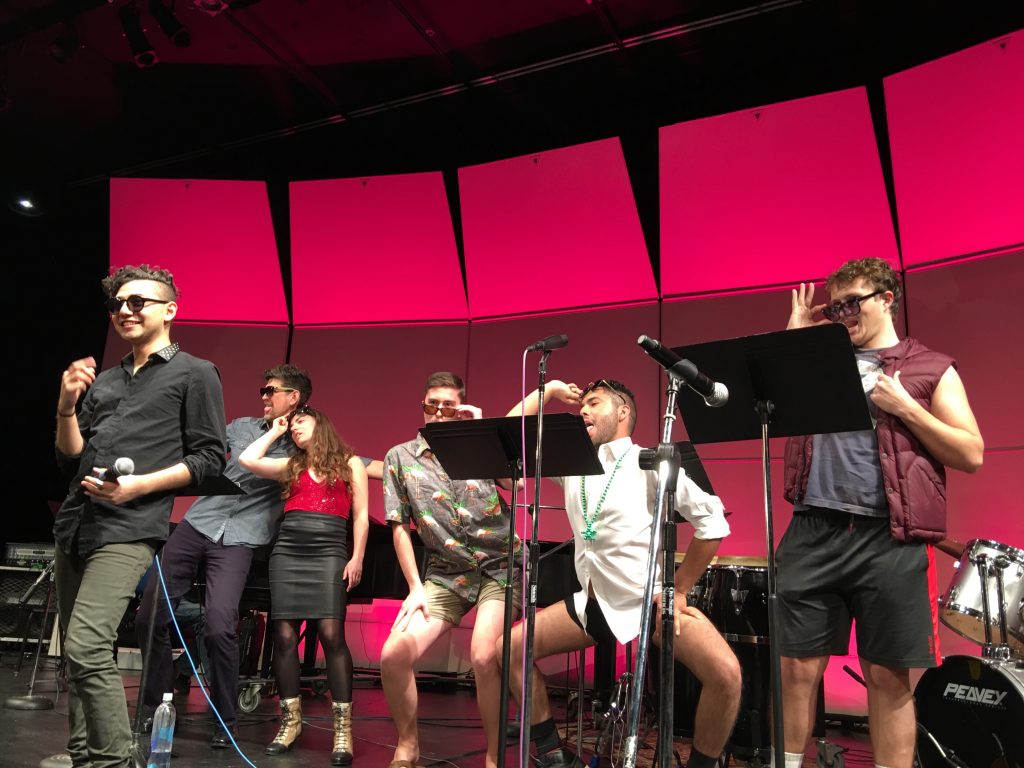NWEAMO 2017 Festival with Swarmius and scenes from ‘St. Francis de los Barrios’
In recent years, the New West Electronic Arts & Music Organization, aka NWEAMO, has presented its annual NWEAMO Festival as a movable feast, taking its surprising musical wares to different venues scattered about San Diego. Friday, March 17, NWEAMO returned to its home base, the J. Dayton Smith Recital Hall at San Diego State University, where festival director and composer Joseph Martin Waters and his cohorts opened the 2017 NWEAMO Festival.
Opening night concert of the festival featured Waters’ signature instrumental ensemble Swarmius, an expected component of any NWEAMO event, but it also premiered four excerpts from Waters’ new opera in progress Saint Francis de los Barrios, featuring countertenor Rudy Alexander Giron singing the title role. The premise of the opera incarnates the 13th-century saint as a transgender sex worker in contemporary Tijuana, working miracles in that city’s red-light district.In the ensemble piece “Street Sex,” Waters’ trademark angular, pulsating contrapuntal themes animated a chorus of street people taunting the corrupt and hypocritical mayor of Tijuana, yet the composer crafted lyrical, angst-filled melodic arcs for Francis in his soliloquy “Help You to Live” and in his moving duet “You Said Once You Loved Me” with the opera’s protagonist Selina, a medical attendant with whom Francis had a daughter. Members of the local SD City Opera ensemble ably supplied the chorus to back up Giron in the “Street Sex” excerpt.
As Waters displayed in his 2015 “Suite Noir” for orchestra and soloists, his solo vocal melodies catch the ear with just a hint of heart-tugging cabaret singer’s pathos, a quality that Giron’s rich, gleaming countertenor delivered with unequivocal emotional power. In the role of Selina, Sarah Perez’s dark, creamy contralto matched Giron’s countertenor beautifully. If I listened only to the singers, I could have imagined their duet as a scene from a grand Baroque opera, but then Handel did not have access to either electric guitars or the digital computer sounds Waters used to accompany his singers!
Francis’ angry denunciation of the Tijuana Chief of Police “Corner Room in Hell” struck me as a contemporary “Queen of the Night” Aria, which Giron delivered with the fiery declamation such works require. In his role as librettist, Allan Havis crafted an economical, street-savvy text that aptly balanced his poetic sense with the grit of border town verismo.
Giron also gave a transcendent account of Waters’ earlier solo vocal “Things,” a moving, almost Impressionist existential meditation on death set to the composer’s own poetry.
Swarmius opened the concert with Waters’ “Cornelia Street,” a toccata of manic counterpoint and dizzying fugal artistry that featured Todd Rewoldt’s blazing alto sax volleys, Daniel Pate’s fleet vibraphone articulations, and Geoffrey Burleson’s ecstatic piano figurations—all integrated with the composer’s digital sonic magic. “Cornelia Street” is J. S. Bach’s Art of Fugue on steroids or some other mind-altering substance that no mere prescription could procure.
Burleson offered his tribute to the late American composer and electronic instrument inventor Raymond Scott in his new work “Powerhouse Passacaglia,” based on Scott’s recording of “Powerhouse,” a gnarly instrumental piece that Warner Bros. acquired in the 1940s to use as a music sampler for their cartoons. Scored for piano, alto sax, and drum kit, Burleson recreated Scott’s original “Powerhouse” as a stately passacaglia that grows into a festive, muscular jazz melee. Themes were competitively tossed back and forth between Burleson on piano and alto sax virtuoso Rewoldt. And don’t think this organist failed to note Rewoldt’s sneaky interpolation of Bach’s theme from his C Minor Organ Passacaglia into his improvised sax elaborations.
To close the concert, Waters pulled out more brass—Ian Buss on tenor sax, Bradley Nash on baritone sax, and trombonist Skyler MacKinnon—to augment Swarmius in Waters’ “Resist,” which he recently wrote for big band. Even this scaled-down chamber version of “Resist,” replete with aggressive musical ideas and incessant iterations of brutal tango rhythmic figures, projected ample authentic daemonic intensity.
[themify_box style=”shadow” ]This concert by NWEAMO was sponsored by the San Diego State University School of Music and Dance and was performed in the university’s J. Dayton Smith Recital Hall. The NWEAMO 2017 Festival continues in this venue through Sunday, March 19, 2017.[/themify_box]

Ken Herman, a classically trained pianist and organist, has covered music for the San Diego Union, the Los Angeles Times’ San Diego Edition, and for sandiego.com. He has won numerous awards, including first place for Live Performance and Opera Reviews in the 2017, the 2018, and the 2019 Excellence in Journalism Awards competition held by the San Diego Press Club. A Chicago native, he came to San Diego to pursue a graduate degree and stayed.Read more…

